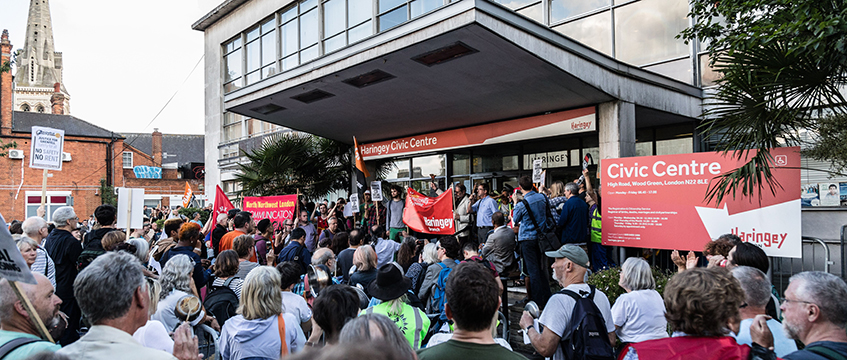Rebuilding trust is the key to regeneration
Post-Grenfell and post-Haringey, community faith in developers is at a low.
Rebuilding trust in the real estate sector will not happen overnight. For it to happen at all, much needs to change: the language of development needs updating, consultation needs to be meaningful, and recognition that we are operating in a different world needs to be universal.
Brexit has dominated this week’s Labour party conference, necessarily so. But the relationship between the public and private sectors has also been centre stage. From extending employee share ownership, to renationalisation, to PFI reform, a Labour government would radically reform the relationship between the private and public sectors.
Post-Grenfell and post-Haringey, community faith in developers is at a low.
Rebuilding trust in the real estate sector will not happen overnight. For it to happen at all, much needs to change: the language of development needs updating, consultation needs to be meaningful, and recognition that we are operating in a different world needs to be universal.
Brexit has dominated this week’s Labour party conference, necessarily so. But the relationship between the public and private sectors has also been centre stage. From extending employee share ownership, to renationalisation, to PFI reform, a Labour government would radically reform the relationship between the private and public sectors.
Where would that leave more traditional joint ventures between local authorities and developers? That’s not clear yet, but already Labour-led councils are changing the way they engage. They have to, even with no change of government. Local electorates – especially in London – expect it.
Not a dirty word
Twenty council leaders and developers sat down at a dinner in Liverpool on Sunday night, hosted by Mishcon de Reya, the London Communications Agency and EG, to discuss how those relationships might be reframed.
Grenfell showed the danger – and tragic consequences – of failing to invest in housing stock of all tenures. Haringey’s decision to scrap its £2bn development partnership with LendLease showed what could happen if the political climate changes.
For Darren Rodwell, leader of Barking and Dagenham Council, regeneration need not be a dirty word. Yet it has become one, over perhaps 40 years.
Right to Buy has meant social housing has become the only option for those “not good enough to buy”. As well as reframing regeneration, Rodwell says so much more needs to change – from the “nonsense word” affordable, to the unrealistic hoardings that surround developments.
In his borough, it’s not regeneration that delivers affordable housing that’s being pursued, but “infrastructure homes for aspirational working class people who make London pulse on a day-to-day basis”.
For this form of tenure to be fully understood, living costs should be transparent too, using “council comparative rents” established on a borough-by-borough basis. “That’s how you start turning round a dirty word like affordability,” he says.
L&Q’s development director Fiona Fletcher Smith – until recently a senior GLA official – agrees. “The big word in all of this is trust,” she says. “Haringey was a fantastic idea, but if you are not taking the community with you it’s just not going to work.
“In a post-Grenfell world we all have to deal with a lack and breakdown of trust. We have a job to do to rebuild that trust in some way. How are we as big property companies delivering something right for the local authority and the local area? It may mean giving away a little bit, but it’s a business imperative.”
Mixed messages
Regeneration has become associated with gentrification, of course, and housing whose cost puts home ownership out of reach for many. But mixed messages aren’t helping either.
The retail crisis is creating the mixed message of “regenerate my high street, but don’t gentrify my town”. Meanwhile, the fact that more and more local authorities are building homes themselves blurs the lines further.
In Hackney, for example, the council is rebuilding the Colville Estate in Hoxton, including homes for private sale from £600,000 to £2.95m. Had this been a project led by the private sector rather than the council, the backlash would have been far more considerable.
There are multiple causes, of course. Pat Hayes, managing director of Barking & Dagenham Council’s housing vehicle Be First, blames the planning system for “inadvertently driving land price to create a model of development, which becomes increasingly high price. We’ve got trapped in a vicious circle”.
And it’s by no means universal. Urban Splash co-founder Tom Bloxham says the regeneration-as-a-dirty-word debate is a “London-centric” phenomenon: “Lots of places want it. Many parts of the UK would say ‘give us a bit of regeneration please’.”
While language matters, it’s not the most important consideration. At the London borough of Camden, councillor Danny Beales’ job title has undergone symbolic change. Once responsible for regeneration, Beales is now cabinet member for investing in communities.
He believes the two aren’t, and shouldn’t be, mutually exclusive: “If you do regeneration with communities, getting it right from the start, no-one cares what it’s called.”
To send feedback, e-mail damian.wild@egi.co.uk or tweet @DamianWild or @estatesgazette











